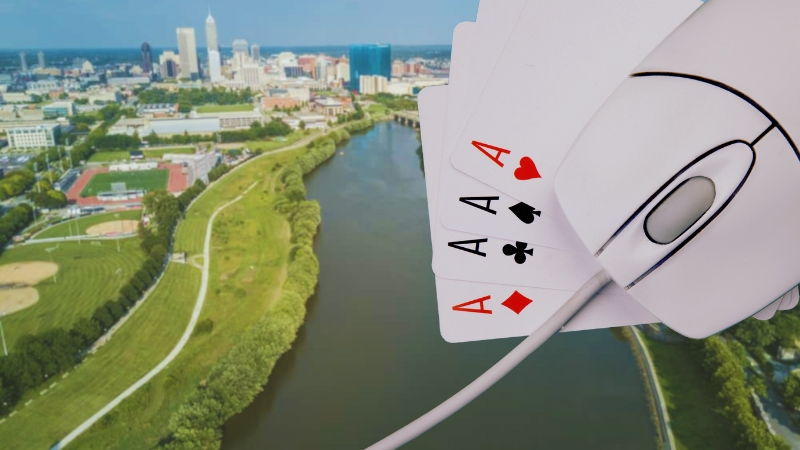It’s no secret that Indiana’s casino industry generates both revenue and environmental costs. Anyone who’s ever stepped into one of the state’s casinos knows they can be pretty energy-intensive.
From the bright lights to the constant hum of machines and the throngs of visitors who need to travel to get there, traditional casino operations can have a serious environmental footprint.
Now, imagine if more people could enjoy those same games from the comfort of their own homes. As Indiana considers expanding its iGaming options, it’s easy to see how that shift could not only boost revenue but also help reduce the pollution and waste associated with brick-and-mortar casinos.
Let’s look at why iGaming could be a win-win for both our economy and our planet.
iGaming as A Growing Revenue Stream for Indiana

Before we dig into the environmental benefits, let’s talk about the financial side of things. The numbers around Indiana’s potential iGaming revenue are pretty impressive.
According to an Indiana Gaming Commission (IGC) report, by implementing iGaming options, the state could generate up to $2.065 billion in gross gaming revenue over the first three years. That’s according to forecasts that average several different spending models.
Think about the tax benefits, too. Depending on how the state decides to tax iGaming, Indiana could see anywhere from $413 million to $929 million in tax revenue during those same three years. That’s a serious influx of money that could be reinvested in all sorts of initiatives, including green energy projects or infrastructure improvements.
But, here’s the kicker: while traditional casinos are raking in revenue, they’re also contributing to pollution. As someone who’s seen the effects firsthand, it’s clear to me that iGaming has the potential to drastically reduce the environmental impact of Indiana’s gaming industry.
Reducing Traffic and Emissions
One of the biggest environmental burdens from casinos is traffic. Picture this: thousands of people driving to casinos every day. They’re coming from all over, often driving long distances to get to popular venues. That means increased emissions, congested highways, and all the pollution that comes with more cars on the road.
However, as discussed on The Team Ignition Show, online gaming offers a modern solution. Instead of people driving to a casino, they can simply log in from home. No cars, no emissions. Just a click of a button and they’re playing their favorite games. It’s an instant reduction in carbon emissions, and it doesn’t take a genius to see how beneficial that would be.
Fewer cars on the road not only means less pollution, but it also reduces wear and tear on our infrastructure. Over time, that could mean less frequent repairs on highways and roads, which in itself is an energy- and resource-intensive process.
Energy Consumption

Casinos are energy hogs. Think about all the lights, the slot machines, the massive HVAC systems keeping everything cool—even when it’s packed with people. Casinos are often open 24/7 so that energy consumption doesn’t take a break. It’s a constant drain on resources.
With iGaming, none of that is necessary. Sure, there’s some energy involved in keeping servers running and maintaining the online platforms, but it’s a fraction of what it takes to run a full-scale casino. When people play online, they’re using their own electricity at home, which is already part of their daily routine. There’s no additional strain on a single venue or its local grid.
If Indiana moves more of its gaming operations online, the energy savings could be massive. It’s a shift that could significantly cut down on the state’s overall energy use, especially if more people opt for online gaming over physical casino visits.
Tackling Casino Waste
Let’s not forget about the sheer amount of waste that traditional casinos generate. Think about all the paper tickets, food wrappers, plastic cups, and general trash created by thousands of daily visitors. Large events, such as concerts or special promotions, only add to the mountain of waste.
On top of that, there’s e-waste. Slot machines, electronic gaming tables, and other tech-heavy elements of a casino eventually wear out and need replacing. The disposal of these items can be problematic, particularly when it comes to safely getting rid of materials like plastics and heavy metals found in electronics.
With iGaming, much of that waste disappears. When people are playing from home, they’re not using casino-provided materials, and there’s no need for physical tickets or plastic chips. Even things like restaurant waste are no longer part of the equation. It’s a huge step in reducing the casino industry’s overall waste footprint.
iGaming’s Green Potential

The potential is there for the state to make a serious leap into the world of iGaming, and if it does, the benefits go beyond financial gain. It could be a smart move for the environment as well.
1. Less Commuting
- Fewer people traveling to casinos = reduced carbon emissions
- Lower fuel consumption, reduced traffic, and less wear on infrastructure
2. Energy Efficiency
- iGaming platforms consume far less energy than a physical casino
- Homes are already consuming energy, so there’s no extra strain on localized grids
3. Reduced Waste
- No more paper tickets, plastic chips, or disposable cups
- Fewer large-scale events mean less event-related waste
4. Flexibility for Players
- Players get the convenience of gaming from home without needing to travel
- Encourages responsible gaming, as it’s easier to control the environment and limit distractions
Green Initiatives and Reinventing Casino Spaces

What’s also exciting is the possibility for Indiana to repurpose some of its casino spaces. As more people turn to iGaming, casinos might not need to operate at full capacity, which could open the door to innovative uses for those spaces.
Imagine casinos investing in green energy or redesigning parts of their properties to focus on eco-friendly activities. They could incorporate renewable energy sources like solar panels or even transition into entertainment hubs that focus on sustainability. It’s an opportunity for casinos to reinvent themselves in ways that align with our growing environmental consciousness.
The methodology behind this analysis involves reviewing projected iGaming revenue in Indiana using three distinct forecasting methods: Spend per Adult, Spend as a Percentage of Gross State Product (GSP), and Spend as a Percentage of Personal Disposable Income (PDI).
Additionally, we examined the environmental impacts of traditional casinos, focusing on factors such as traffic emissions, energy consumption, and waste generation, and considered how iGaming could mitigate these issues.
Can Indiana Lead the Way?
It’s not just about reducing pollution, though. There’s a broader question of whether Indiana can lead by example. With the potential revenue from iGaming and the environmental benefits it brings, the state has a unique opportunity to show how economic growth and environmental stewardship can go hand in hand.
As someone who loves this state and wants to see it thrive, I’m excited by the potential here. Let’s not just think about the financial windfall. Let’s also think about how we can use iGaming as a tool for good—both for our economy and our environment.



